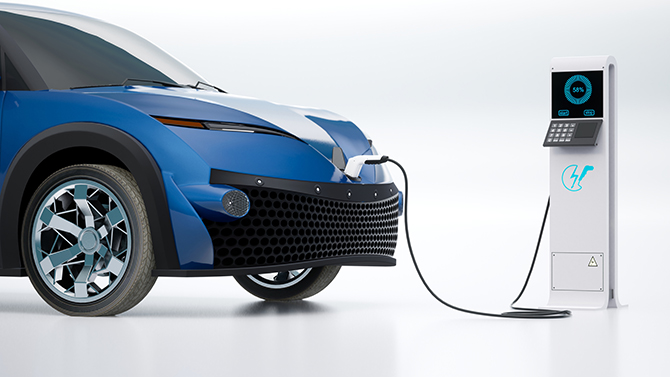Social Issues addressed by Sumitomo —Compass for the Future—
Tackling EV introduction issues in collaboration with partners
Pursuing growth as a platformer
 Electrification of mobility
Electrification of mobility Decarbonization
DecarbonizationWith vehicle leasing as its mainstay business, Sumitomo Mitsui Auto Service (SMAS) aims to help realize a sustainable society based on its corporate philosophy: “Contribute to the progress of the automotive society and the improvement of the global environment by exceeding customer expectations in inspiring ways.” SMAS is a leader in vehicle leasing, owning and managing around one million vehicles Group-wide and serving 50,000 corporate customers. SMAS’s value proposition goes beyond leasing to encompass provision of comprehensive high-quality vehicle management services—covering everything from environmental measures, safety and reliability to cost reduction— that help customers and society resolve the issues they face.
To help achieve the 2050 carbon neutrality targets promoted by the Japanese government, SMAS established the EV & Carbon-Free Promotion Department (present-day EV & Carbon-Neutral Promotion Dept.) in October 2021, an organization dedicated to supporting EV introduction and decarbonization of companies and the public sector.
The automotive industry is undergoing a once-in-a-century transformation. EVs are attracting attention as the future of mobility because they do not emit CO2 during their use, thus contributing to carbon neutrality, and their batteries can be used as power sources in the event of a disaster. Yet there is much work to be done since, compared with gasoline-fueled internal-combustion-engine vehicles, initial costs of EVs are still relatively high, their charging facilities remain sparse, and so range anxiety persists when venturing beyond the security of home-based charging.
Despite a growing trend among environmentally conscious foreign companies in Japan to switch their company fleets to EVs as one element in their drive to become carbon neutral, many companies and municipalities in Japan still feel the hurdle to EV introduction is dauntingly high.
To lower the hurdle, the EV & Carbon-Neutral Promotion Dept. is establishing one-stop EV service providers offering companies and municipalities comprehensive support covering proposals for EV introduction plans, selection of EV models according to purpose of use, charging infrastructure and charging service arrangements, after-sales service, as well as renewable energy facilities and energy management. Through partnerships with automakers, EV-related companies, energy management and mobility startups, and bodies with a regional footprint such as local government and regional financial institutions, SMAS proposes tailor-made solutions.

The company is also pursuing R&D to maximize the value of EVs, which represent the future of mobility, including through development of new services exploiting EV characteristics as power sources and the study of a circular economy model, such as reuse of EVs whose lease periods have expired and recycling of the storage batteries installed in the EVs.
Mobility Passport is a one-stop app for SMAS customers that are seeking to reduce vehicle-related costs and centrally manage transportation arrangements. With this app, users can reserve company cars and arrange alternative vehicles, such as rental cars and car sharing, from their smartphones. The app also offers management functions necessary for business mobility, such as recording alcohol check results, logging daily driving reports, and managing driving licenses, all in one application.
ALnote, a free app specifically for Mobility Passport’s alcohol check function, was introduced recently. By recording the results of drivers’ alcohol checks and centrally managing the accumulated data, the app helps streamline the administrative duties of driving safety supervisors, thus responding to the mandatory requirements of the revised Road Traffic Act that came into force in April 2022.

SMAS proposes the optimal number of vehicles to be owned based on analysis to maximize fleet utilization by the combination of company vehicles and rental vehicles. A reduced fleet contributes to lower CO2 emissions as well as lower cost of ownership of vehicles. The company also encourages its customers to use the cost savings to introduce more EVs.
As decarbonization gains momentum in Japan and around the world, awareness in society is changing dramatically, giving the introduction of EVs a tailwind. Government is also endeavoring to boost EV demand while enhancing affordability by providing subsidies for EVs and other vehicles with excellent environmental performance, including those usable as emergency power sources in the event of a disaster, while at the same time promoting the development of charging infrastructure and other necessary facilities throughout Japan.
SMAS is evolving into a “mobility platformer,” a reliable partner that helps resolve environmental and societal issues by establishing next-generation mobility services centering on EVs.


Read about initiatives to achieve a low-carbon society, aiming at net-zero greenhouse gas emissions since these emissions are implicated in global warming.

In view of ongoing globalization and the growing complexity of supply chains, companies need to respond appropriately to issues in supply chains.

The pace of workstyle reform is accelerating as the COVID-19 pandemic has prompted numerous companies to embrace novel ways of working.

For companies, the COVID-19 pandemic has brought the crucial importance of employee health into sharp focus.

Accelerating global warming poses serious business risks. Accordingly, companies need to formulate strategies and implement specific countermeasures from a medium- to long-term perspective.

Spurred by efforts to reduce environmental impacts and in line with increasing social needs, replacement of gasoline-powered vehicles with electric vehicles is accelerating.

Vigorous initiatives are afoot to tackle social issues by revitalizing communities and the interpersonal relationships that bind them together.

Poverty persists in contemporary Japan and the existence of child poverty is a grave concern.

In view of the continuing decline of Japan’s working age population, due to population aging coupled with a low birthrate, development of the next generation is an urgent issue.

The rapid progress in medicine in recent years is largely due to the efforts of not only universities and other research institutions but also of companies to develop cutting-edge technologies.

Numerous initiatives to promote industry and commerce at the regional and community level are underway, involving the use of renewable energy and thus contributing to decarbonization.

One-third of food produced is lost or wasted globally, amounting to about 1.3 billion tons per year. Food loss and waste is a pressing issue in need of a solution.

Companies are addressing a wide range of issues so that people and companies can coexist in harmony with the global environment.

In addition to natural disasters, there are various types of hazards whose nature, incidence and severity are changing with the times. Resilience and flexibility are indispensable in dealing with them.

Read about initiatives to achieve sustainable regional revitalization. The attributes and resources that each region can offer are leveraged to strengthen local economies and overcome the problem of population decline.